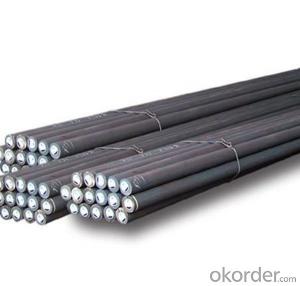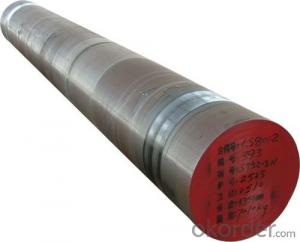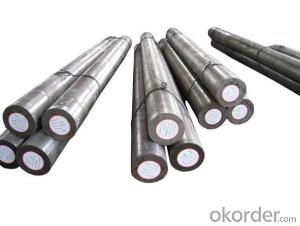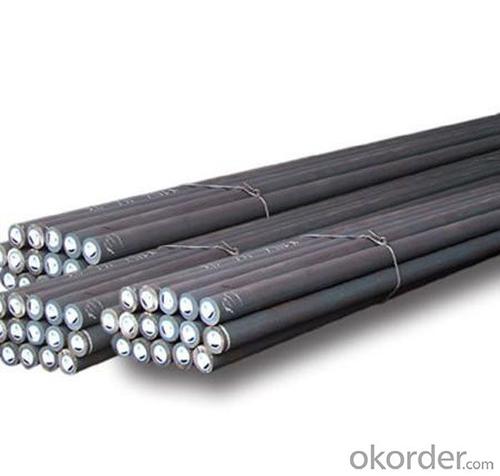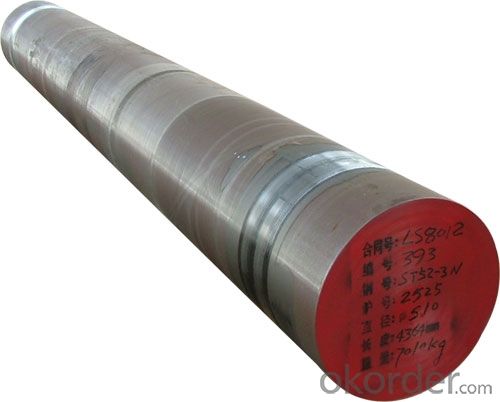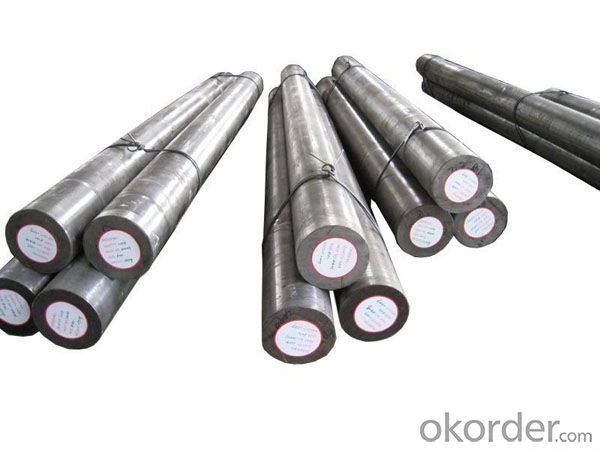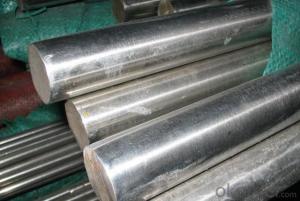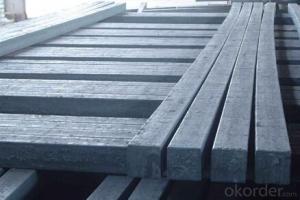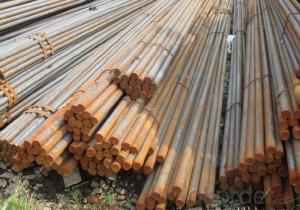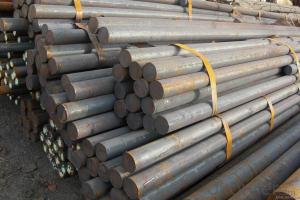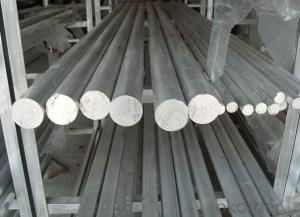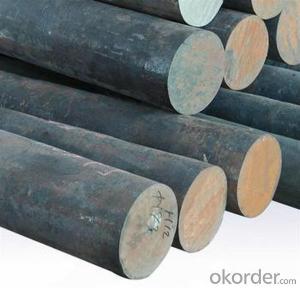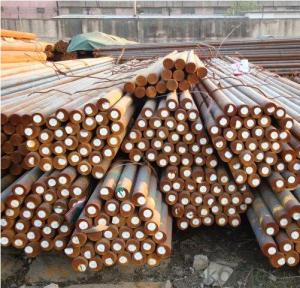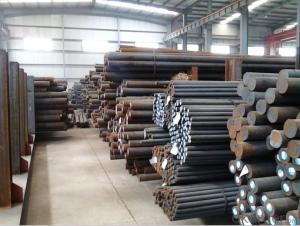4Cr5MoSiV1 Mould Steel Special Steel Alloy Steel
- Loading Port:
- China main port
- Payment Terms:
- TT OR LC
- Min Order Qty:
- 25 m.t.
- Supply Capability:
- 10000 m.t./month
OKorder Service Pledge
OKorder Financial Service
You Might Also Like
Specification
Chemical Composition%
| Country | Standard | C | Si | Mn | Cr | Mo | V | S | P |
| China(GB) | 4Cr5NoSiV1 | 0.32-0.45 | 0.80-1.20 | 0.20-0.50 | 4.75-5.50 | 1.10-1.75 | 0.80-1.20 | ≤0.030 | ≤0.030 |
| USA(ASTM) | H13 | 0.32-0.45 | 0.80-1.20 | 0.20-0.50 | 4.75-5.50 | 1.10-1.75 | 0.80-1.20 | ≤0.030 | ≤0.030 |
| Germany(DIN) | 1.2344 | 0.37-0.42 | 0.90-1.20 | 0.30-0.50 | 4.80-5.50 | 1.20-1.50 | 0.90-1.10 | ≤0.030 | ≤0.030 |
| Japan(JIS) | SKD61 | 0.37-0.42 | 0.90-1.20 | ≤0.50 | 4.50-5.50 | 1.00-1.50 | 0.80-1.20 | ≤0.030 | ≤0.030 |
Available Size
| Rolled flat steel | 20-90mm×205-610mm×L |
Heat Treatment
| Item | Temperature℃ | Hardness |
| Anneal | 750-800 | ≤229HB |
| Quenching | 1020-1050 | 56-58HRC |
| Quenching | 530-600 | 45-50HRC |
Characterstics
| 1.Higher thermal strength and hardness | ||||||
| 2.Better toughness and elevated temperature fatigue resistance | ||||||
| 3.Hardness maintaining ability at 600℃ | ||||||
| 4.Good polishing performance |
Applications: Suitable for aluminum and copper die-casting moulds working for long time at elevated temperatures,hot extrusion dies,core rod forging dies,plastic moulds,etc,also suitable for heat resistance thimbles,push rods and ejector sleeves


1, Your advantages?
professional products inquiry, products knowledge train (for agents), smooth goods delivery, excellent customer solution proposale
2, Test & Certificate?
SGS test is available, customer inspection before shipping is welcome, third party inspection is no problem
3, Payment Terms?
30% TT as deposit and 70% before delivery.
Irrevocable L/C at sight.
4, Trading Terms?
EXW, FOB, CIF, FFR, CNF
6, After-sale Service?
We provides the services and support you need for every step of our cooperation. We're the business partner you can trust.
For any problem, please kindly contact us at any your convenient time.
We'll reply you in our first priority within 24 hours.
- Q: What are the advantages of using special steel in manufacturing?
- There are several advantages of using special steel in manufacturing. Firstly, special steel has superior strength and durability compared to regular steel, making it ideal for applications that require high levels of toughness and resistance to wear and tear. Additionally, special steel offers better corrosion resistance properties, allowing the manufactured products to withstand exposure to harsh environments or corrosive substances. Moreover, special steel can be tailored to have specific mechanical properties, such as increased hardness or flexibility, allowing manufacturers to create products with precise specifications. Lastly, special steel often exhibits excellent heat resistance, making it suitable for applications that involve high temperatures or extreme thermal conditions. Overall, the use of special steel in manufacturing provides enhanced performance, longevity, and reliability to the end products.
- Q: What are the specific requirements for special steel used in the nuclear fuel industry?
- The specific requirements for special steel used in the nuclear fuel industry are stringent and demanding. These requirements are necessary to ensure the safety and reliability of nuclear power plants. Here are some of the key specifications for special steel used in this industry: 1. High temperature resistance: Special steel used in the nuclear fuel industry must be able to withstand high temperatures without losing its structural integrity. This is crucial as nuclear reactors generate extreme heat during operation. 2. Corrosion resistance: Nuclear fuel environments can be highly corrosive due to the presence of hot and pressurized water, radiation, and chemical reactions. Special steel used in the industry must have exceptional corrosion resistance to prevent degradation and maintain safety. 3. Radiation resistance: The nuclear fuel industry involves exposure to radiation. Special steel needs to have excellent resistance to radiation damage and embrittlement to ensure long-term structural integrity and prevent any risk of failure. 4. High strength and toughness: Special steel used in the nuclear fuel industry should possess high strength and toughness to withstand the extreme conditions experienced within a nuclear reactor. This ensures that the steel can withstand the pressure and stress exerted on it during reactor operation. 5. Low neutron absorption: Neutron absorption is a critical factor in nuclear reactors. Special steel used in the industry should have low neutron absorption properties to prevent interference with the nuclear reactions and to maintain reactor efficiency. 6. Strict quality control and traceability: The manufacturing and fabrication of special steel for the nuclear fuel industry must adhere to stringent quality control procedures to ensure consistency and reliability. Traceability is also crucial to identify the origin and history of the steel, allowing for comprehensive inspections and assessments. Meeting these specific requirements is essential for the safe and efficient operation of nuclear power plants. Special steel used in the nuclear fuel industry must undergo rigorous testing, certification, and quality control processes to ensure its compliance with these stringent specifications.
- Q: What are the specific requirements for special steel used in the textile machinery industry?
- The specific requirements for special steel used in the textile machinery industry can vary depending on the specific application and machinery involved. However, there are some general requirements that are common in this industry. 1. Corrosion resistance: Textile machinery is often exposed to moisture, chemicals, and other corrosive substances. Therefore, the special steel used in this industry must have excellent corrosion resistance properties to ensure durability and longevity. 2. High strength: Textile machinery operates under high loads and stresses. Hence, the special steel used must have high strength to withstand these forces and prevent any deformation or failure. 3. Wear resistance: Textile machinery involves constant contact between different components, resulting in wear and tear. Therefore, the special steel used should have good wear resistance properties to minimize the effects of friction and prolong the lifespan of the machinery. 4. Heat resistance: Textile machinery often operates at high temperatures due to the friction generated during the manufacturing process. The special steel used should have excellent heat resistance to prevent any deformation or loss of mechanical properties under high temperature conditions. 5. Machinability: The special steel used in the textile machinery industry should be easily machinable to allow for the production of complex components with precise dimensions. This ensures that the machinery operates smoothly and efficiently. 6. Cost-effectiveness: While meeting all the above requirements, it is essential for the special steel used in the textile machinery industry to be cost-effective. Manufacturers aim to balance the performance and cost to ensure that the machinery remains competitive in the market without compromising on quality. It is important to note that these requirements can vary depending on the specific application within the textile machinery industry. Therefore, it is crucial for manufacturers and engineers to carefully evaluate the requirements of their machinery and select the appropriate special steel accordingly.
- Q: How does special steel compare to other materials?
- Special steel is known for its exceptional strength, durability, and resistance to corrosion, making it superior to many other materials. Its unique composition and manufacturing processes result in improved performance, higher load-bearing capacity, and enhanced safety compared to other materials. Additionally, special steel offers excellent heat resistance, making it suitable for a wide range of applications, including automotive, construction, and aerospace industries.
- Q: What are the environmental impacts of using special steel?
- The use of special steel can have several environmental impacts. Firstly, the production of special steel involves the extraction of raw materials such as iron ore and coal, which can lead to deforestation, habitat destruction, and loss of biodiversity. The mining process can also result in the release of pollutants into the air, soil, and water, contributing to air and water pollution. Another environmental impact of special steel production is the emission of greenhouse gases, particularly carbon dioxide (CO2), during the manufacturing process. The high temperatures required to melt and shape the steel, as well as the energy-intensive processes involved, result in significant CO2 emissions. These emissions contribute to climate change and global warming. Furthermore, the transportation of special steel can also have environmental consequences. The shipping and logistics involved in transporting the steel from production facilities to end-users can result in additional greenhouse gas emissions, air pollution, and fuel consumption. Additionally, the disposal of special steel products at the end of their lifecycle can pose environmental challenges. If not properly recycled or disposed of, steel products can end up in landfills, taking up valuable space and potentially leaching harmful substances into the environment. Despite these environmental impacts, it is important to note that special steel is often used in various industries due to its durability, strength, and resistance to corrosion. Efforts are being made to mitigate these impacts through the adoption of cleaner production methods, such as recycling and using renewable energy sources in the steel manufacturing process. Additionally, initiatives like carbon capture and storage are being explored to reduce greenhouse gas emissions from steel production. Overall, while the use of special steel provides numerous benefits, it is critical to balance these advantages with the need to minimize its environmental impacts through sustainable production and responsible disposal practices.
- Q: What are the main characteristics of corrosion-resistant steel?
- Stainless steel, also referred to as corrosion-resistant steel, possesses distinct qualities that render it highly resistant to corrosion. Below are the primary attributes of this type of steel: 1. Exceptional resistance to corrosion: An essential feature of corrosion-resistant steel is its capacity to withstand corrosion. This is achieved through the addition of specific alloying elements, namely chromium, nickel, and molybdenum, which generate a protective layer on the steel's surface. This layer, known as the passive layer, prevents the steel from coming into contact with corrosive substances, including moisture, chemicals, and acids. 2. Superb durability: Corrosion-resistant steel boasts remarkable durability, making it suitable for diverse applications in harsh environments. It can endure extreme temperatures, high humidity levels, and corrosive chemicals without deteriorating or compromising its structural integrity. This durability ensures that structures constructed from corrosion-resistant steel enjoy an extended service life, thereby reducing the need for frequent maintenance and replacements. 3. Aesthetically pleasing: In addition to its functionality, corrosion-resistant steel offers aesthetic appeal. Its smooth and polished surface bestows it with a visually pleasing appearance, rendering it a popular choice for architectural applications, interior design, and decorative elements. The ability to maintain its appearance over time, without rusting or discoloration, enhances its desirability in both industrial and residential settings. 4. High strength: Renowned for its strength and toughness, corrosion-resistant steel retains its mechanical properties even in corrosive environments. Consequently, it can withstand heavy loads, impacts, and other external forces, making it suitable for applications where structural integrity and safety are paramount. Examples include bridges, buildings, marine equipment, and automotive components. 5. Versatility: Corrosion-resistant steel exhibits versatility in terms of its applications. It can be easily fabricated, welded, machined, and formed into various shapes and sizes, thereby allowing for customization and adaptability. This versatility renders it ideal for a wide array of industries, encompassing construction, aerospace, automotive, chemical processing, and marine. 6. Hygienic properties: Another crucial characteristic of corrosion-resistant steel lies in its hygienic properties. Its non-porous surface impedes the growth of bacteria, making it suitable for applications in the food and beverage industry, healthcare facilities, and pharmaceutical manufacturing. Furthermore, its ease of cleaning and maintenance further bolsters its hygiene standards. In summary, corrosion-resistant steel seamlessly combines exceptional resistance to corrosion with durability, strength, versatility, and aesthetic appeal. These characteristics render it a dependable and cost-effective material for various industries, ensuring long-term performance and protection against the detrimental effects of corrosion.
- Q: How does special steel perform in erosion applications?
- Special steel is known for its exceptional performance in erosion applications. Its unique properties such as high hardness, corrosion resistance, and wear resistance make it highly suitable for environments where erosion is a common issue. Erosion is the gradual wearing away of a material due to the action of external forces such as abrasion, impact, or cavitation. In applications where erosion is prevalent, such as mining, oil and gas, and chemical processing industries, regular steel may not be able to withstand the harsh conditions and may quickly deteriorate. Special steel, on the other hand, is specifically designed to withstand erosive forces and maintain its structural integrity over an extended period. Its high hardness helps it resist abrasion and prevents the material from wearing down quickly. This makes it ideal for applications involving the movement of abrasive materials or fluids. Furthermore, special steel also exhibits excellent corrosion resistance, which is crucial in erosive environments. It can resist the corrosive effects of chemicals, moisture, and other harsh substances, ensuring the material's longevity and performance. In addition to hardness and corrosion resistance, special steel also offers exceptional wear resistance. It can withstand repeated impacts, high pressures, and sliding contact without significant damage, making it highly effective in erosion-prone applications. This wear resistance helps to minimize downtime and maintenance costs associated with material replacement or repair. Overall, special steel's properties make it a reliable and durable choice for erosion applications. Its ability to resist abrasion, corrosion, and wear ensures that it can withstand the demanding conditions often found in such environments, providing long-lasting performance and reducing the need for frequent replacements.
- Q: What are the requirements for special steel used in transportation infrastructure?
- To ensure the durability, strength, and resistance to various environmental factors of special steel used in transportation infrastructure, certain requirements must be met. These requirements include: 1. High Strength: The special steel utilized in transportation infrastructure needs to possess high tensile strength to withstand heavy loads and stresses. It should be capable of resisting deformation and maintaining its structural integrity under significant pressure. 2. Corrosion Resistance: Transportation infrastructure is frequently exposed to harsh weather conditions, such as rain, humidity, and saltwater. Excellent corrosion resistance is essential for the special steel to prevent rusting and deterioration over time, particularly in bridges, tunnels, and railway tracks located near coastal areas. 3. Fatigue Resistance: Due to repetitive and cyclic loading, transportation infrastructure is susceptible to fatigue failure if the steel used is not resistant to this type of stress. To prevent cracking and failure caused by repeated loading, the special steel should possess good fatigue resistance properties. 4. Weldability: Construction and repairs are facilitated by the good weldability of the special steel used in transportation infrastructure. It should be easily weldable without compromising its strength and performance. 5. Impact Resistance: Impact loads from vehicles are exerted on transportation infrastructure, such as guardrails and crash barriers. Special steel with excellent impact resistance is necessary to absorb and distribute the energy from impacts, reducing the risk of catastrophic failure. 6. Fire Resistance: In the event of a fire, the special steel utilized in transportation infrastructure should have a high melting point and retain its structural integrity for a reasonable amount of time. This is crucial for the safety of passengers and minimizing damage caused by fire incidents. 7. Low Maintenance: To ensure cost-effectiveness and long-term sustainability, the special steel used in transportation infrastructure should require minimal maintenance. It should have a long service life and minimal need for repainting, repair, or replacement. By meeting these requirements, the special steel used in transportation infrastructure can provide a safe, reliable, and durable foundation for roads, bridges, railway tracks, and other critical components of the transportation network.
- Q: How is special steel used in toolmaking?
- Special steel is used in toolmaking because of its exceptional properties such as high hardness, toughness, and wear resistance. It is utilized to manufacture various types of tools including drills, cutting tools, dies, and molds. The superior properties of special steel enable these tools to withstand high temperatures, resist deformation, and maintain sharpness for extended periods. Additionally, special steel can be heat treated to achieve specific characteristics, making it an ideal choice for toolmaking applications.
- Q: What are the properties of low alloy steel?
- Low alloy steel possesses a combination of improved strength, toughness, and corrosion resistance compared to regular carbon steel. It contains a small amount of alloying elements (such as manganese, nickel, chromium, or molybdenum) that enhance its mechanical properties. Additionally, low alloy steel has the advantage of being more cost-effective than high alloy steels, making it a popular choice in various industries.
Send your message to us
4Cr5MoSiV1 Mould Steel Special Steel Alloy Steel
- Loading Port:
- China main port
- Payment Terms:
- TT OR LC
- Min Order Qty:
- 25 m.t.
- Supply Capability:
- 10000 m.t./month
OKorder Service Pledge
OKorder Financial Service
Similar products
Hot products
Hot Searches
Related keywords
